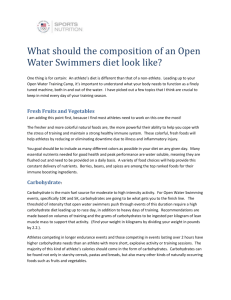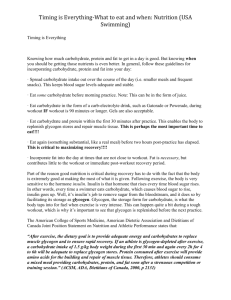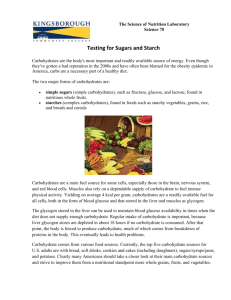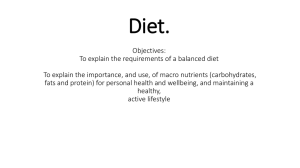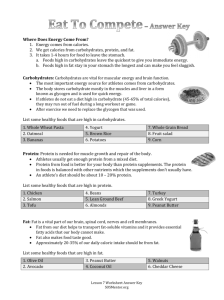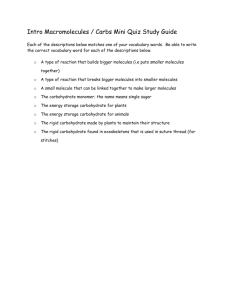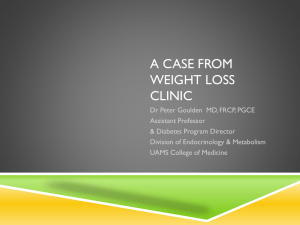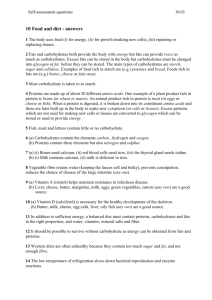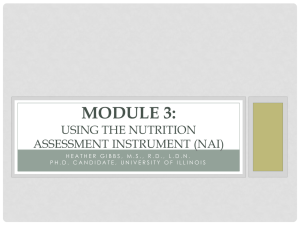nutrition for sport and exercise
advertisement
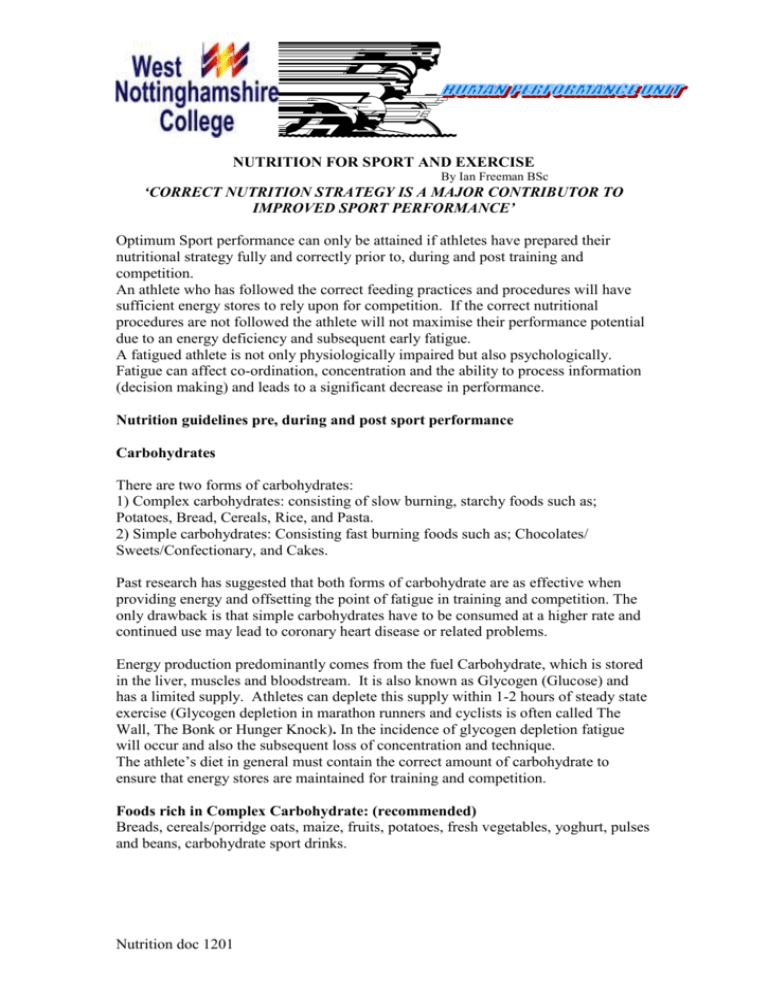
NUTRITION FOR SPORT AND EXERCISE By Ian Freeman BSc ‘CORRECT NUTRITION STRATEGY IS A MAJOR CONTRIBUTOR TO IMPROVED SPORT PERFORMANCE’ Optimum Sport performance can only be attained if athletes have prepared their nutritional strategy fully and correctly prior to, during and post training and competition. An athlete who has followed the correct feeding practices and procedures will have sufficient energy stores to rely upon for competition. If the correct nutritional procedures are not followed the athlete will not maximise their performance potential due to an energy deficiency and subsequent early fatigue. A fatigued athlete is not only physiologically impaired but also psychologically. Fatigue can affect co-ordination, concentration and the ability to process information (decision making) and leads to a significant decrease in performance. Nutrition guidelines pre, during and post sport performance Carbohydrates There are two forms of carbohydrates: 1) Complex carbohydrates: consisting of slow burning, starchy foods such as; Potatoes, Bread, Cereals, Rice, and Pasta. 2) Simple carbohydrates: Consisting fast burning foods such as; Chocolates/ Sweets/Confectionary, and Cakes. Past research has suggested that both forms of carbohydrate are as effective when providing energy and offsetting the point of fatigue in training and competition. The only drawback is that simple carbohydrates have to be consumed at a higher rate and continued use may lead to coronary heart disease or related problems. Energy production predominantly comes from the fuel Carbohydrate, which is stored in the liver, muscles and bloodstream. It is also known as Glycogen (Glucose) and has a limited supply. Athletes can deplete this supply within 1-2 hours of steady state exercise (Glycogen depletion in marathon runners and cyclists is often called The Wall, The Bonk or Hunger Knock). In the incidence of glycogen depletion fatigue will occur and also the subsequent loss of concentration and technique. The athlete’s diet in general must contain the correct amount of carbohydrate to ensure that energy stores are maintained for training and competition. Foods rich in Complex Carbohydrate: (recommended) Breads, cereals/porridge oats, maize, fruits, potatoes, fresh vegetables, yoghurt, pulses and beans, carbohydrate sport drinks. Nutrition doc 1201 FATS Fats are a staple requirement within an athlete’s diet, but a high fat diet is usually detrimental to sport performance. The calories that form fat are higher than that of carbohydrates thus fats are not as easily broken down during the metabolic process of oxidising foodstuffs. Energy production from fats is abundant and burned optimally in the presence of carbohydrate. Without carbohydrate (glycogen depletion) availability leads to hitting the Wall where the body has to rely on fats as the predominant fuel supply and demands a greater supply of oxygen to produce energy (The calories obtained from fats are insufficient when it comes to providing energy for steady state and high intensity exercise). Energy from fat is not easily burned, therefore an overindulgence in fatty foods (and other foodstuffs) if not required by the body for work production will be stored in the body at various sites (usually subcutaneous (under the skin) and unfortunately mainly in the stomach region). Increases in body fat/mass requires the body to produce more power to move the extra weight during sport performance, this extra force will ensure that fatigue will occur much earlier. Foods rich in fats: Margarine, butter, Cream, oils, Meat, Full fat milk and Nuts. PROTEIN “The stuff we are made of”. Every part of the body contains protein from muscles, and blood to skin, tendons, ligaments and the immune system. Although providing a low energy yield, proteins are an essential as part of an athlete’s balanced diet. Providing the building blocks for muscle growth and repair, many people are led to believe that proteins are responsible for building large muscle masses, however this is not true, you need to eat a balanced diet rich in carbohydrates alongside correct protein and fat intakes to build muscle mass successfully. Evidence gathered in studies suggests that some sports benefit from increased protein and amino acid supplement intakes, but in general a correct protein replenishment strategy will replace all body requirements and essential amino acids necessary for muscle repair and protection. Foods rich in Protein Meat (lean), Fish, Non-fat dairy produce, soya products Nutrition doc 1201 The ideal athletic diet ratio for optimal training and competition condition Nutrient Ratio for optimal sport performance Protein 25% Fat 15% Carbohydrate 60% NUTRITION STRATEGY Pre competition “It is important to follow a well balanced diet constantly and not just the day before competition” To ensure sufficient energy is available for performance it is recommended that a high carbohydrate meal is ingested 2-4 hours prior to competition. This enables digestion and sufficient energy supplies to be available ready for sport performance. Foods such as Cereal, Rice, Pasta, and Fruits are recommended along with energy (glucose/electrolyte) drinks and energy bars (such as; Powerbar, Maxim, Nutri-grain). Try to include 300-400 grams of carbohydrate depending on when you eat the meal (Eg; the earlier you eat the meal the higher the carbohydrate content) Good examples of this are: 3 bananas (50grams), 1 baked potato (average size) (50-75grams), 150 grams of rice/pasta, Energy bar (75-100grams), 4 slices of bread (50grams) If you need to top up approximately 1 hour prior to competition it is recommended that you consume 50-100g of a sport drink and energy bars. Nutrition doc 1201 During competition Try to refuel with small amounts of food (if required) and especially fluids at every possible interval during training and competitions. It is important to refuel the body as much as possible to ensure energy supplies are maintained. Try to use energy bars and sports drinks as they are designed for fast, efficient and effective absorption into the body’s systems. Post training and competition refuelling Replenishment of muscle and liver glycogen stores are of massive importance in relation to the recovery processes of an athlete. The amounts of food to be consumed depend on the volume and intensity of training and competition. It is important to remember that there is a window for optimal refuelling post exercise. This window is when the muscles are more permeable (absorb more) in storing and utilising glycogen and takes place for approximately 2 hours post exercise. If you do not replace lost carbohydrates you will wake up for training or competition the next day with stiff joints, heavy muscles and general fatigue due to neglecting empty glycogen stores in the muscles. Optimum recovery depends on consuming a high carbohydrate meal (75-100g) as soon as possible post performance. Again sport drinks, energy bars or fruit are excellent ways to replenish lost fuel and also good practice to undertake even if not hungry after a demanding session. In short a high carbohydrate diet should be a normal part of the athlete/sport performers training regimen. Remember that 60% of the diet should be given to carbohydrate. A good way to measure this is to check each plateful of food for the percentage of carbohydrate, fats and proteins place on it. Ensure sufficient energy stores are maintained to allow maximal ability to train and perform optimally at all times and especially during heavy/high intensity workload periods. Make sure that normal protein intake is monitored and avoid consuming too many high-fat meals (McDonalds etc). REFERENCES Astrand, P.O. and Rodahl, K. (1986) Textbook of Work Physiology, 3rdedition, McGraw-Hill, New York. McArdle, W.D., Katch, F.I. and Katch, V.L. (1996) Exercise Physiology: Energy, Nutrition and Human Performance. 4th edition. Baltimore, Md. Williams and Wilkins. Nutrition doc 1201
